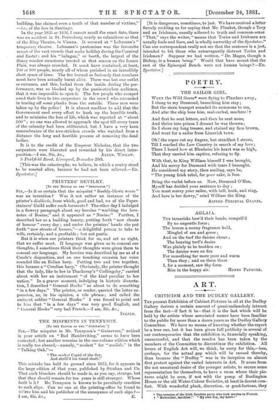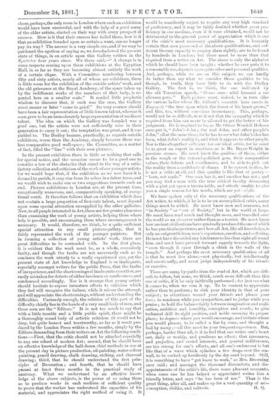ART.
CRITICISM AND THE DUDLEY GALLERY.
THE present Exhibition of Cabinet Pictures in oil at the Dudley Gallery derives a certain amount of quasi-melancholy interest from the fact—if fact it be—that it is the last which will be held by the artists whose associated names have been familiar to the public for more than a dozen years as the Dudley Gallery Committee. We have no means of knowing whether the report be a true one, but it has been given full publicity in several of our contemporaries that the exhibition is, financially speaking, unsuccessful, and that the resolve has been taken by the members of the Committee to discontinue the exhibition. All lovers of English Art will, we think, be sorry for this,—less, perhaps, for the actual gap which will be caused thereby, than because the " Dudley " was in its inception an almost first protest against the vested interests in Art. It arose from the not unnatural desire of the younger artists, to secure some representation for themselves, to have a room where their pic- tures might be seen, if not with the pomp of Burlington House or the old Water-Colour Societies, at least in decent com- fort. With wonderful pluck, discretion, or good-fortune, they • The remains of the Irish Jacobite party who took service in France.
t mabosebal, ms,ehree ..Xy own boy, my heart !"
chose, perhaps,the only room in London where such an exhibition would have been successful, and with the help of a good many of the older artists, started on their way with every prospect of success. How is it that their success has failed them, how is it that an exhibition founded upon so certain a want, can no longer pay its way ? The answer is a very simple one, and if we may be pardoned the egotism of saying so, we foreshadowed the present state of things, in an article upon this Gallery written in the Spectator four years since. We there said,—" A change is in some respects coming upon these exhibitions at the Egyptian Hall, in so far as they are becoming almost entirely the work of a certain clique. With a Committee numbering between fifty and sixty artists, nearly all of whom are exhibitors, there is little room for the exhibition of the outside artists' work, and the old grievance at the Royal Academy, of the space taken up by the indifferent works of the members of that body, is re- peated here on a smaller scale." It needed little prophetic wisdom to discover that, if such was the case, the Gallery must sooner or later " come to grief." Its very essence should have been a fair representation of little-known talent, whereas it soon grew to be an immoderately large representation of mediocre talent. The idea on which the Gallery was founded was a good one, but the artists were not sufficiently wise in their generation to carry it out ; the temptation was great, and it was yielded to. The Dudley became, practically, as regards outside -exhibitors, worse than the Academy, simply because there was less comparative good wall-space; the Committee, as a matter of fact, filled the " line " with their own pictures.
In the present exhibition there is little or nothing that calls for special notice, and the occasion seems to be a good one to consider a few of the obstacles that stand in the way of a satis- factory collection and criticism of the work of our younger artists, for we would hope that, if the exhibition as we now have it is doomed to perish, it may rise from its ashes in a fairer form, and we would wish to make one or two suggestions towards such an end. Picture exhibitions in London are, at the present time, exceptionally numerous, and, comparatively speaking, of excep- tional merit. It therefore follows that an exhibition which does not contain a large proportion of first-rate talent, must depend upon some special attraction unsupplied by the other galleries. Now, to all people interested in Art, there are few greater pleasures than examining the work of young artists, helping them where help is possible, and encouraging them where encouragement is necessary. It would, therefore, we think, be a quite sufficient special attraction to any small picture-gallery, that it fairly represented the work of the younger painters. But in forming a collection of young artists' work, there are great difficulties to be contended with. In the first place, it is evident that the work must be, as a whole, excessively faulty, and though the faults are not necessarily such as to condemn the work utterly to a really experienced eye, yet the present state of Art knowledge in England is so inadequate, especially amongst writers for the public Press, that the faults of inexperience, and the shortcomings of inadequate execution, are easily mistaken for defects of either insolence or carelessness, and condemned accordingly. Nor is it strange that young artists should hesitate to expose immature efforts to criticism which they feel will recognise the failure, while it misses the attempt, and will appreciate the shortcomings, without understanding the difficulties. Curiously enough, the solution of this part of the difficulty chiefly lies in the hands of a very small body of men, and those men are the " Editors." It is not too much to say that with a little trouble and a little public spirit, there might be a thoroughly sound body of artistic criticism (it would not be deep, but quite honest and trustworthy, as far as it went) pro- duced by the London Press within a few months, simply by the Editors demanding from their writers on Art the following condi- tions :—First, that the critic should not be attached especially to any one school of modern Art ; second, that he should have an effective knowledge of the half•dozen chief methods in use at the present day in picture production, oil-painting, water-colour painting, pencil drawing, chalk drawing, etching, and charcoal drawing ; third, that he should understand the first prin- ciples of Decoration ; and fourth, that he should have passed at least three months in the practical study of anatomy. What we understand by an effective know- ledge of the above subjects, is the power of so using them as to produce works in each medium of sufficient quality to prove that the worker has understood the capacities of his material, and appreciates the right method of using it. It would be manifestly unjust to require any very high standard of proficiency, and it may be fairly doubted whether great pro- ficiency in one medium, even if it were obtained, would not be detrimental to the general power of appreciation which is one of the critic's most necessary qualifications. It is humanly certain that meu possessed of the above qualifications, and suf- ficient literary capacity to employ them rightly, are to be found by hundreds in London ; but there must be more than that required from a writer on Art. The above is only the alphabet which he should have been taught ; whether be ever puts it to a reasonable use, depends upon quite other and personal qualities. And, perhaps, while we are on this subject, we can hardly do better than say what we consider those qualities to be, though, in truth, they have little to do with the Dudley Gallery. The first is, we think, the one indicated by the old Tereutian speech, " Homo sum : uihil huumui a me alienum puto." Each picture must, indeed, be in turn (like the various ladies whom Mr. Gilbert's eccentric hero meets in Engaged) "the tree upon which the flower of his heart grows," and this, too, without conscious inconstancy. This, perhaps, would not be so difficult, were it not that the sympathy which is required from him can never be allowed to get the better of his judgment.. He is required to be, as Mr. Oliver Weudell Holmes once put it, " John's John ; the real Juhu, and other people's John," all at the same time; for he has to see what John's idea has been, what John's reality is, and what it appears to other people. Nor is this altogether sufficient for our ideal critic, for he must be as great an expert in emotions, as is Mr. Bryce-Wright in precious stones. He must know the qualities of them, either in the rough or the cut-and-polished gem, their comparative values, their defects and excellencies, and be able to pick out the reality from a multitude of shams. if he cannot do this, he is not a critic at all, and this quality is like that of poetry- " born, not made." One man has it, and another has not ; and you may find a man with the true critical faculty drumming with a pint pot upon a tavern-table, and utterly unable to give you a single reason for his words, which are yet—right.
We have spoken only of the necessary qualifications of the Art writer, to which, if he is to be an accomplished critic, many things must be added. He must know men and manners, not " in Society " or " out of Society," but in the world at large. He must have read much and thought more, and travelled over the world as an observer rather than as a tourist. He must know how ancient civilisations have gradually produced the one of which he has practical experience, and how all Art, like all knowledge, is only an outgrowth from men's experience, emotion, and suffering. He must have discarded any hindrance to his clear sight all round him, and must have pressed forward eagerly towards the light, " even though it came through a chink in the walls of the temple." And perhaps the most necessary qualification of all is that he must live alone,—not physically, but intellectually and emotionally, and must judge independently of his friends or enemies.
There are many by-paths from the road of Art, which are diffi- cult to follow, but none, we think, much more difficult than this one of critic, if it be only faithfully performed ; for just see what it comes to, when we sum it up. To be content to appreciate rather than to perform ; to sink your identity in that of your subject ; to oftentimes wound your friends and please your foes ; to condemn while you sympathise, and to judge while you praise ; to hold the balance fairly between imagination and reali- sation, ambition and humility, conception and result; to give technical skill its right position, and noble meaning its proper place ; to depress where you would encourage, and irritate where you would please; to be called a liar by some, and thought a fool by many ;—all this must be your frequent experience. But, perhaps, harder than all, is it to feel that one writes one's heart out, daily or weekly, and produces no effect; that ignorance, and prejudice, and vested interests, and general indifference, are too strong for one's efforts, and all one's endeavour is but like that of a wave which splashes a few drops over the sea- wall, to be sucked up heedlessly by the dry sand beyond. Still, it is something to have " got leave to work," as Mrs. Browning once said ; and amongst the thousand discomforts and dis- appointments of the critic's life, there come pleasant moments, when some one he has helped or appreciated writes him. a friendly letter, and says "he has been of use." That is the great thing, after all, and makes up for a vast quantity of mis- conception, dislike, and solitude. H. Q.







































 Previous page
Previous page